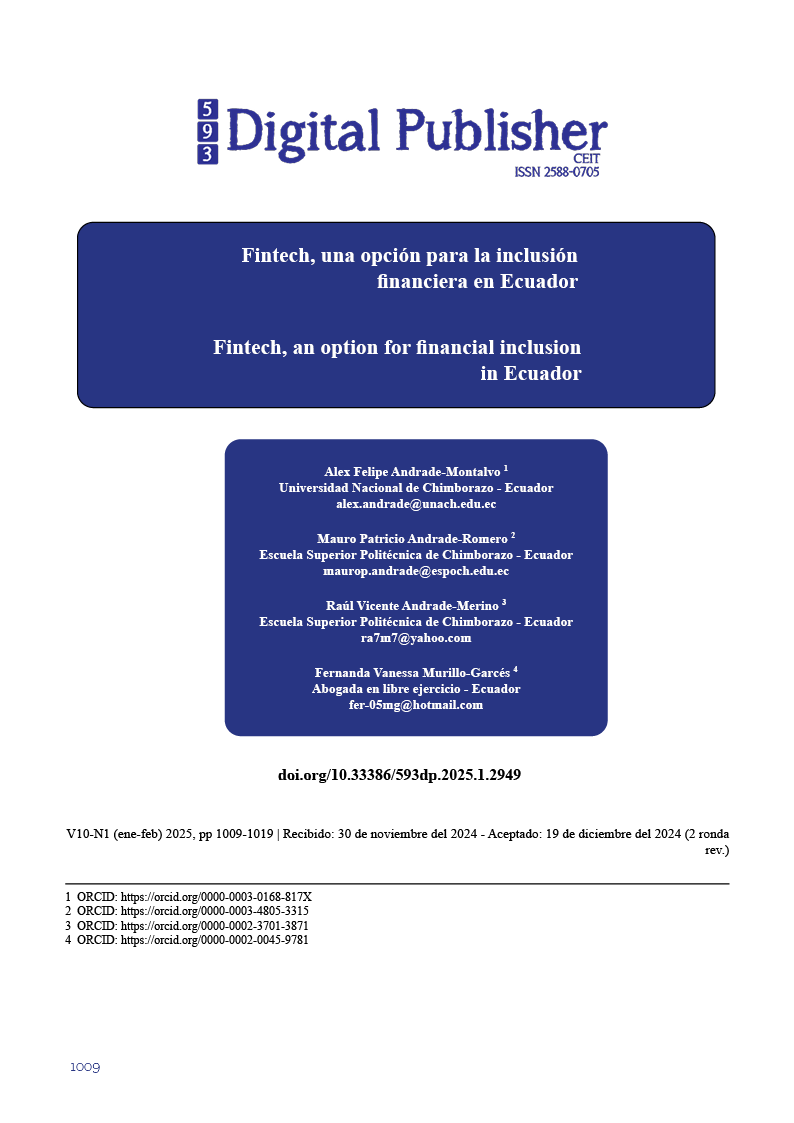Fintech, an option for financial inclusion in Ecuador
Main Article Content
Abstract
Financial inclusion in most developing countries is a goal of the DAVOS 2030 Forum, a global initiative to build a more sustainable and inclusive world, which covers various aspects such as sustainable development and inclusion with regard to access to essential services, opportunities and rights. In Ecuador, a significant part of the population lacks access to traditional banking services, so these companies offer efficient, economical and accessible solutions, through mobile applications, online platforms and other digital means, which can be more accessible and profitable than physical bank branches. Its need is justified by the existence of limited financial infrastructure in rural areas, inadequate documentation and lack of trust in financial institutions prevent many people from accessing banking services; In this context, Fintech-based companies offer innovative solutions to provide alternative services to those who do not have access to traditional banking services, improving their financial well-being and contributing to the economic growth and general stability of the country. By incorporating more people into the formal financial system, Fintechs can stimulate economic activity, increase savings and facilitate access to credit. In the main, it is concluded that loans through Fintech platforms allow access to timely and low-cost financing, creating a new form of capital flow for productive, service and social projects.
Downloads
Article Details

This work is licensed under a Creative Commons Attribution-NonCommercial-ShareAlike 4.0 International License.
1. Derechos de autor
Las obras que se publican en 593 Digital Publisher CEIT están sujetas a los siguientes términos:
1.1. 593 Digital Publisher CEIT, conserva los derechos patrimoniales (copyright) de las obras publicadas, favorece y permite la reutilización de las mismas bajo la licencia Licencia Creative Commons 4.0 de Reconocimiento-NoComercial-CompartirIgual 4.0, por lo cual se pueden copiar, usar, difundir, transmitir y exponer públicamente, siempre que:
1.1.a. Se cite la autoría y fuente original de su publicación (revista, editorial, URL).
1.1.b. No se usen para fines comerciales u onerosos.
1.1.c. Se mencione la existencia y especificaciones de esta licencia de uso.
References
Andrade, R., y Andrade, M. (2019). Los autónomos una alternativa, frente a la crisis del capital. Editorial ESPOCH.
Andrade, R., y Andrade, M. (2020). Alianza estratégica. Instrumentos para fortalecer la economía popular y solidaria. Editorial ESPOCH. https://doi.org/http://cimogsys.espoch.edu.ec/direccion-publicaciones/public/docs/books/2019-12-18-164319-Alianza%20estrat%C3%A9gica.pdf
Asamblea Nacional. (2012). Ley Orgánica de Instituciones del Sistema Financiero. Registro Oficial 250 de 10 de diciembre de 2012.
Ayala, B. (2024). Servicios financieros digitales: construyendo un ecosistema global seguro e innovador. Micro Fianzas. Revista de la Red de Instituciones Financieras de Desarrollo (37), 11-12. https://doi.org/https://rfd.org.ec/docs/2024/Revista%20microfinanzas%2037/Revista%20microfinanzas%2037.pdf
Baron, J., y Forero, L. (2021). Análisis de las Fintech y su aporte a la inclusión financiera en Colombia. Revista Estrategia Organizacional, 11(2), 145-164. https://doi.org/https://doi.org/10.22490/25392
Chaparro, A. (2020). Fintech, una Apuesta de la Tecnología para la Inclusión Financiera en el Mundo. Alianza EFI. https://doi.org/https://alianzaefi.com/wp-content/uploads/2023/01/WP3-2020-004.pdf
Cueva, M. (2021). Las Fintech como alternativa de inclusión financiera en Ecuador. Universidad Andina Simón Bolívar. https://doi.org/https://repositorio.uasb.edu.ec/bitstream/10644/8325/1/T3619-MAE-Cueva-Las%20Fintech.pdf
Delgado, K., y Loor, I. (2021). De la digitalización bancaria a la inclusión financiera: un estudio exploratorio desde las microfinanzas. Digital Publisher, 6(3).
Fajardo, R., y Vieira, J. (2023). Análisis de determinantes y gestión de riesgos en crowdfunding de préstamos entre pares. Desarrollo Gerencial, 15(2), 1-29. https://doi.org/https://doi.org/10.17081/dege.15.2.6604
Gómez, G., Navarro, J., y Marchena, L. (2022). El crowdlending como alternativa de financiamiento para las mipymes del Perú. Revista de Ciencias de la Administración y Economía, 12(23), 161-177. https://doi.org/https://rfd.org.ec/biblioteca/pdfs/LG-346.pdf
González, K. (2020). Fintech y la inclusión financiera en la agenda 2030 para el desarrollo sostenible: una visión global. Un Espacio Para la Ciencia, 3(1), 71-95.
Íñiguez, F. (2021). Regulación para las Fintech en el Ecuador. Estudios de la Gestión. Revista Internacional de la Administración (9), 209-133. https://doi.org/https://revistas.uasb.edu.ec/index.php/eg/article/view/2580
Llerena, V. (2024). La tecnología y la digitalización están revolucionando la inclusión financiera. Micro Fianzas. Revista de la Red de Instituciones Financieras de Desarrollo, 3-4. https://doi.org/https://rfd.org.ec/docs/2024/Revista%20microfinanzas%2037/Revista%20microfinanzas%2037.pdf
Putnam, R. (1993). Making Democracy Work: The Civic Traditions in Modern Italy. Princeton University Press.
Quiñones, B., y Sunimal, F. (2018). El capital social en las finanzas solidarias. Polo de Socio-Economía de Solidaridad. https://doi.org/https://base.socioeco.org/docs/doc-236_es.pdf
Rupeika, R. (2020). Ideas for a Regulatory Definition of FinTech. International Journal of Economics and Business Administration(2), 136-154. https://doi.org/10.35808/ijeba/448
Salas, A., Miranda, J., y Saldaña, R. (2022). Las Fintech y el proceso de inclusión financiera en Perú. QUIPUKAMAYOC, 30(3), 69-79. https://doi.org/https://doi.org/10.15381/quipu.v30i63.24043
Tueros, F., Dávila, R., Quispe, S., y Rosso, L. (2023). Método de financiación crowdlending: ventajas y desventajas para las medianas y pequeñas empresas. Revista Lidera, 38-43. https://doi.org/https://revistas.pucp.edu.pe/index.php/revistalidera/article/view/28548
Unger, D. (1999). Development as Freedom. Anchor Books.
Velázquez, M. (2020). Empresas fintech, activos virtuales y la era digital: retos y oportunidades en México. 9(18), 1-27. https://doi.org/https://doi.org/10.23913/ricea.v9i18.153





